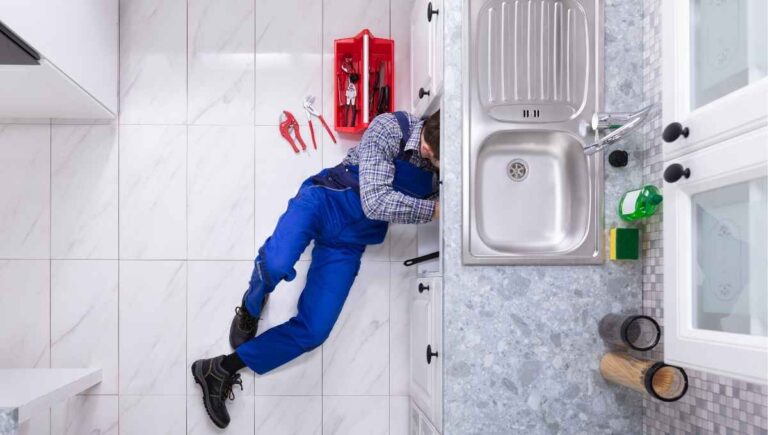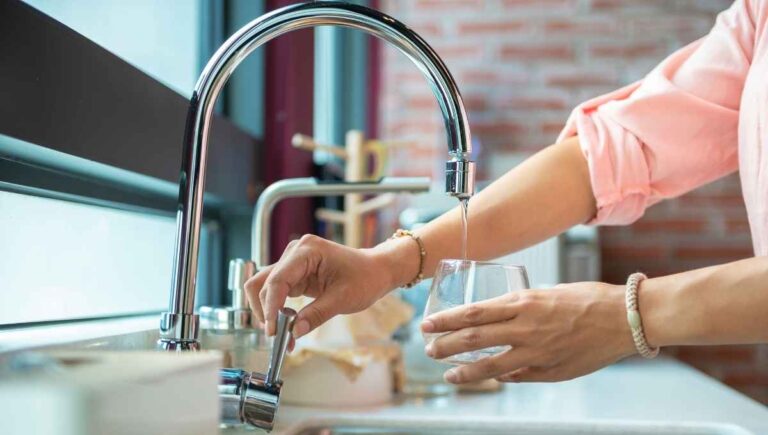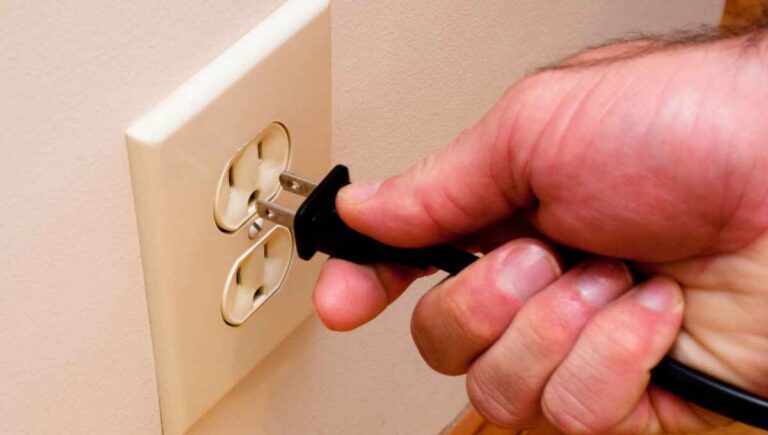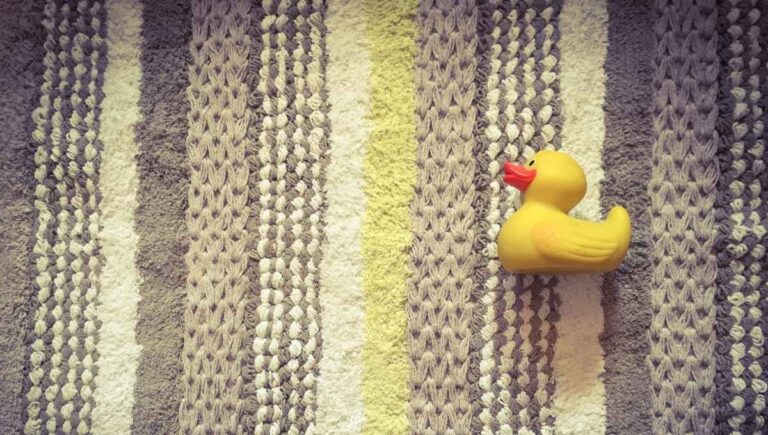Can I Drink Water Out of the Kitchen Sink? (Use This First)
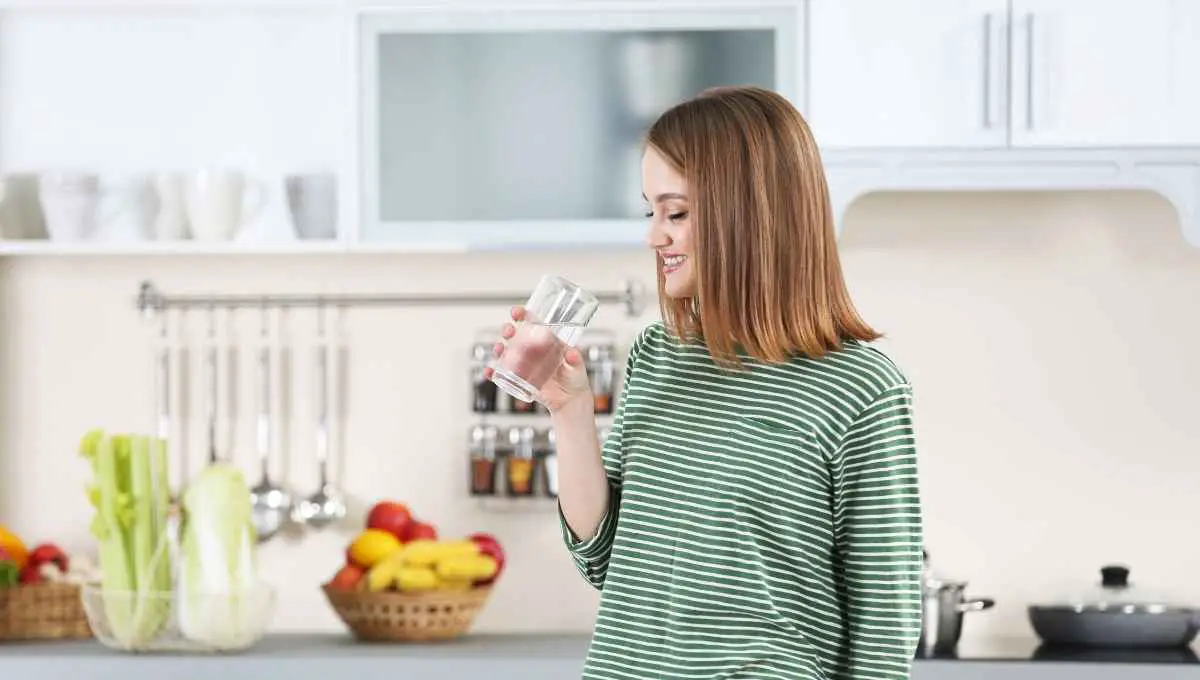
Summer is coming — we’re more thirsty and the sun’s heat is unbearable. Of course, we want to have an easier way to drink water without having to spend some cash. This may have you wondering if you can drink water out of the kitchen sink?
In the United States, kitchen tap water is often safe to drink, so long as it’s not contaminated due to a malfunction of the water purifying systems. If so, drinking tap water can become hazardous to human health, and can even cause death.
As much as we want all sources of water to be safe, we can’t ignore that we have to take extra measures to take care of ourselves.
Hopefully, this article will help you understand the pros and cons of drinking water out of the kitchen sink, what could happen if you drink contaminated water and what to do if you want to drink tap water safely.
This post contains affiliate links. This means Household Blogger may earn a commission should you make a purchase using any of our links. Please refer to our full affiliate disclosure policy for full details.
Here’s a Quick Pro Tip!
Kitchen tap water is usually safe, but if something unexpected happens, things can go down real quick and your household may be at risk of getting sick. Therefore, to avoid this, you may want to get a water filter to help you.
We think you’ll love our preferred water filter:
1. Waterdrop Long-Lasting Water Filter – Keep your kitchen tap water germ-free.
2. Under Sink Water Filter System – Removes most of the chlorine, fluoride, and arsenic found in your tap water.
3. Countertop Sink Water Filter – Don’t struggle to serve yourself some healthy water. This countertop sink water filter brings you comfort, security, and wellness.
Water From the Kitchen Sink
We want to spend less time worrying about whether we have enough bottled water or not. So, can we use the kitchen tap water? How can we make it safe? Let’s find out below.
Is Kitchen Tap Water Safe to Drink?
Kitchen tap water is deemed safe to drink across the United States, but it’s still recommended to be on the watch for local water advisories. Tap water usually contains certain chemicals and minerals that are usually not harmful for human consumption.
In 1974, Congress enacted the Safe Drinking Water act to make sure that the type of water that arrives to American families is 100% safe. But, even though it’s a marvelous idea, the truth is that sometimes the water system can be compromised.
For example, there had been cases where water systems had high levels of lead. This is the case of what happened in Flint, Michigan, in the year 2014. This issue affected all its residents. Some became severely ill but others, unfortunately, passed away.
From this situation, we can learn that anything can happen. So, it’s best to take our own extra safety measures by using a water filter meant to purify water. And, in the case of independent sources of water, make sure to inspect them regularly to keep things neat and safe.
Is It Safe to Drink Water From a Kitchen Sink?
Water from a kitchen sink is usually seen as safe to drink, although it’s crucial to keep on the lookout for odd-looking things inside your water. Since water systems can become vulnerable, it’s best if we take the extra steps of guaranteeing our safety.
Generally, drinking water from a kitchen sink won’t harm you unless the water is heavily contaminated. And, the best part of it is that, when organizing your house’s plumbing, many plumbers make sure to add a water purifier within the pipes to keep them safe to use.
But, this doesn’t mean that it’s a recommended idea nor that it’s always safe. Water systems can become compromised if one of the machines they need to function fails. Therefore, you should always be on the lookout for local government authority water alerts.
What Will Happen if You Drink Water From the Kitchen Sink?
Two possible outcomes can happen if you drink water from the kitchen sink: you receive the sufficient minerals your body needs to keep operating without further consequence, or you get sick due to contaminated water.
Your city’s water system purposely adds certain chemicals and minerals, such as calcium, fluoride, and magnesium, to keep the water safe to use and parasite-free. So, if you drink tap water, you might consume these compounds that are often judged to be non-harmful.
But, there is another factor to consider: if the water is looking funny, is discolored, or smells foul, perhaps there is a higher concentration than estimated from these compounds or it’s plain contaminated and unsafe. Therefore, drinking it could cause severe reactions, like diarrhea.
You might also enjoy our post on If Kitchen and Bathroom Water are the Same
Is It Okay to Drink Kitchen Sink Tap Water Every Day?
It’s not okay to drink kitchen sink tap water every day. The reason for this is that, if you make it a daily routine, you risk ingesting contaminants often found inside the water. Water systems are not always steady and won’t always provide you with safe water.
The only way you can drink water from the kitchen sink, every day, is by using a faucet water filter, such as Brita’s. If you drink tap water without a water filter, you don’t only risk getting a funky taste, but also getting sick from drinking it.
Why Shouldn’t You Drink Kitchen Tap Water?
You shouldn’t drink kitchen tap water constantly because you can be exposed to severe contaminants within your pipes. For example, a common contaminant that can be found in water is lead, which can be very harmful to human health.
According to US Environmental Protection Agency (EPA), lead is a strong contaminant that can be found naturally in dust, soil, and other industrial items. High levels of exposure to this component can be detrimental to human health, especially in children and pregnant women.
Some of the consequences of being exposed to lead are:
- Reproductive problems
- Cardiovascular issues
- Increased blood pressure
- Complications with the function of kidneys
- Hypertension
- Developmental issues in children
- Risk of miscarriage and premature birth
And, you can have lead within your plumbing, which is inconvenient if you’re the type of person to always drink tap water. So, it’s best to recur to other methods for drinking water to avoid being affected by this.
What Are Four Advantages to Drinking Kitchen Tap Water?
The advantages to drinking kitchen tap water go around the quality control of the water, sustainability, health concerns, and the long-term cost of drinking kitchen tap water. Moreover, some people find it safer to drink than bottled water.
Here are four advantages to drinking kitchen tap water:
- You know exactly what you’re drinking. Public water systems have to undergo serious regulations set by the Environmental Protection Agency. This means that this water is constantly tested for quality control to ensure its safety.
- You avoid damaging the environment. Unlike bottled water, drinking water from the kitchen sink won’t require you to throw plastic waste away, which can be made from non-biodegradable items.
- It’s more affordable. You only have to get your water from the kitchen sink’s faucet, and nothing more. You don’t have to go to the supermarket or buy online for packages of clean water (although, we still highly suggest it because they do taste better).
- You can control how pure your water is. This means that, even though water systems are judged to be safe to drink without the assistance of any purifiers, you can still choose to purify your water with a good water filter. So, this is the best advantage of it all!
Side Effects of Tap Water
Now that we know about the safety of tap water, let’s explore the side effects we might suffer if we ever drink contaminated water. Stay tuned!
Side Effects of Drinking Tap Water From a Kitchen?
The side effects of drinking tap water from a kitchen sink are diarrhea, vomiting, headaches or strong migraines, fever, and kidney failure. Most of these effects will vary depending on what caused the water’s contamination.
However, these are not the only heavy side effects that can happen to you. A study conducted in 2019 revealed that tap water has more than 22 types of cancerous components, such as arsenic, uranium, and radium.
Arsenic is a toxic component that’s often referred to as the “poison king”. Its popularity can be dated back to the 1800s, were many infamous murderers used it as their main weapon. Fun fact, though: many of the people responsible for those murders were women!
So, if your tap water were to have higher rates of arsenic, it would surely harm you. Therefore, it’s strongly advised that you always check your local authority’s alerts in case you need to purify your water for safekeeping.
Is It Safe to Drink Water Straight From the Kitchen Sink?
It’s not always safe to drink water straight from the kitchen sink, as the quality of the water has a high chance of being compromised. The best thing you can do to avoid drinking contaminated water is to add a water filter.
Although drinking water straight from the kitchen sink is perceived to be safe, the truth is that the quality of the water can vary. For instance, if breakage happens to your city’s water system, your water has the risk of being contaminated.
Moreover, if you’re the type of person that has a private water source, then you need to make sure that it’s purified and safe for you to use. So, it wouldn’t be surprising if you already took measures to keep your water germ-free.
Is Kitchen Tap Water Safe to Drink?
Almost all kitchen tap water in the United States is safe to drink, but its quality can vary because of how vulnerable water systems can be. To avoid being exposed to contaminated water, make sure to always keep updated on your local water alerts.
Kitchen tap water doesn’t usually cause harm to the body unless it’s heavily contaminated. But, it’s recommended to use a water filter to receive more hydrating benefits that it needs to keep operating smoothly.
Side Effects of Drinking Kitchen Tap Water?
Some of the side effects that drinking kitchen tap water can give you are diarrhea, vomit, headaches, and other more severe effects. But, other long-term effects can be produced by too much tap water intake.
Even though tap water is generally safe, it’s not exempt from contamination. Your local government purposely adds certain compounds to maintain your water’s quality. But, sometimes, too much of it can cause havoc.
Additionally, it’s proven that tap water can contain cancerous components, such as uranium and radium. Thus, it’s better to use a water filter to prevent ingesting these chemicals daily.
How to Check if Sink Water Is Safe
Hearing the side effects of drinking contaminated water can be scary. But, how can we make our tap water safe? Let’s discuss this topic below.
How Can I Make My Sink Water Safe to Drink?
You can make your sink water safe to drink by boiling the water or adding a water purifying filter to your kitchen. Both options are the safest when it comes to ensuring that you have potable water in your household.
Generally, when your water system suffers from contamination, your local government will issue a boil-water alert. So, boiling water can help you kill all the bacteria that may be inside your water at the moment you extract it from the faucet.
However, sometimes this is tedious to do. So, instead of recurring immediately to the use of boiling water, maybe you can find a water filter instead. They are excellent at taking out the most common harmful substances from the water, so it’s awesome to use.
How Do I Know if the Water From My Kitchen Sink Is Drinkable?
The water coming out of your kitchen sink is drinkable only if the water is clear, and doesn’t smell weird. Foul smell and orangy-brownish looking water are common signs of contaminants inside your water.
So, if your water looks, in essence, “normal”, then it’s safe to drink. But, if it looks weird, tastes weird, or smells weird, you may want to refrain from drinking and consult your local water advisory.
How Do You Test if Your Kitchen Water Is Safe to Drink at Home?
You have to use a water test kit to test the quality of your water at home. Usually, they come with clear and detailed instructions on what you should do to test your water appropriately. This can come in handy if you are questioning the safety of your water.
But, before using a test kit to determine the cleanliness of your water, you need to determine what type of substances you are looking to find in your water. Some home-water testing kits only check for chlorine or lead, while others are more extensive and can give you better details.
Usually, water test kits come with useful strips that need to be handled in a specific way to do the test correctly. Depending on how contaminated is your water, this strip’s color will change to indicate how contaminated or clean your water is.
These instructions vary depending on the type of water testing kit you choose, so you should be on the lookout for that because testing kits aren’t exactly universal.
What’s the Best Way to Drink Kitchen Tap Water?
The best way to drink kitchen tap water is by filtering it. That way, you’ll avoid exposing yourself and your loved ones to contaminants that may be present in your water. You can find purifiers at any home improvement store, or online.
Water filters are designed to keep your water clean, and fresh. Therefore, they are convenient when you want to avoid harsh chemicals in your water, such as fluoride. But, be careful!
Some water filters are only meant to change the taste of the water, and not purify it. So, make sure to check their label before finally purchasing!
The Kitchen Tap Water Safety
But, how truly safe is it to drink tap water from the kitchen sink? Can kitchen tap water really make you sick? Let’s find out below!
Can Kitchen Tap Water Give You the Stomach Flu?
If your kitchen tap water is heavily contaminated, it can give you stomach flu. Stomach flu is also known as viral gastroenteritis, according to Mayo Clinic. And, you can get it by ingesting contaminated foods or liquids.
Stomach flu only affects the intestinal organs. Usually, its symptoms present as vomiting, diarrhea, nausea, stomach cramps, muscle aches, and even low-grade fever. While a healthy person can recover smoothly, this sickness can be severe in infants and older adults.
And, contaminated sources aren’t the only way you can get sick with this. It can also be spread through direct contact with someone who already has it, and the symptoms can present up to three days later. So, make sure to take care of yourself to avoid getting the stomach flu.
Can Kitchen Tap Water Make You Sick?
When contaminated, kitchen tap water can make you sick with nausea, vomiting, diarrhea, and worse symptoms. You can also get sick with E. Coli or Salmonella if it’s the case that the water is contaminated with such diseases.
You can also get sick with parasites and other serious bacteria if you drink your contaminated kitchen tap water. Therefore, it’s extremely important to filter your water to avoid getting sick with these types of illnesses.
Can You Drink Kitchen Sink Water if You Boil It?
You can drink kitchen sink water after boiling it because it’s a way of purifying it. However, it will also depend on the contaminants within your kitchen water. Sometimes, boiling will simply dissolve certain substances and not get rid of them.
Boiling your water will help you get rid of common bacteria and other forms of the microbe, but sometimes it won’t get rid of other chemical components. However, if you believe that boiling water is necessary, you can consult your local government website for more details.
Is It Safe to Drink Boiled Tap Water?
If you boiled tap water to drink it because of a boil-water advisory, then you can safely drink it without further issue. But, keep in mind that boiling water will only get rid of pathogens, and not chlorine-like chemicals.
Boiling water will help you get rid of germs and bacteria, but will not get rid of hard chemicals or lead. However, if you don’t have a water filter near you, your best bet is to boil water to get rid of possible contaminants within your water.
Is Kitchen Tap Water Better Than Bottled Water?
For more hygienic purposes, bottled water is better. Although, most can agree that kitchen tap water and bottled water really have not much difference other than the cost and benefits each has.
Tap water vs Bottled water has been an excruciating debate. While others prefer tap water because of the sustainability and low-cost long-term, others prefer bottled water to prevent having to get exposed to common bacteria that could be present in tap water.
Yet, the majority prefer to use filtered water because it can help you get rid of uninvited substances within your water. Although, most just use it to change the taste of their tap or bottled water. So, you are free to make the best choice in this case.
Related Questions
Is Refrigerator Water Safe to Drink?
Refrigerator water is safer than bottled water, but it poses some health risks. The most common microorganisms found within a refrigerator water compartment are coliform and salmonella. Therefore, it’s best to choose the safest option to drink water.
The reason why it’s not so safe is that refrigerator water compartments get their water the same way as the kitchen sink. Therefore, the best way to ensure that the water from your refrigerator is safe is by installing a refrigerator water filter system.
Why Is Cold Water Not Good to Drink?
Drinking cold water has been associated with digestion problems, therefore, it’s deemed to not be good to drink. Moreover, it can be hazardous for people who are currently experiencing respiratory infections, such as the flu, influenza, or common cold.
The reason why cold water can affect your digestion is that it can slow its process, especially if you’ve recently eaten rich-flour foods.
Although it’s beneficial to drink water before and after a meal, it’s best to digest room-temperature or warm water so that your digestion can run smoothly.
Additionally, cold water can aggravate conditions such as migraines, asthma, and other lung-related issues. For people who have a common cold or influenza, their mucus can become more trapped within their lungs and aggravate their condition.
If this condition aggravates, it can lead to the development of illnesses such as pneumonia, bronchitis, or bronchiolitis. All of them affect the way that your lungs function and will cause you to have more difficulty to breath, which can pose a serious health risk.
Does Boiling Water Remove Chlorine?
Boiling water can remove chlorine, but its effectiveness will depend on the quantity of water you wish to purify and how contaminated your water is. Keep in mind that if chlorine is mixed with other substances, eliminating it will be significantly harder.
You can remove chlorine from water by evaporating it for a timeframe of 15 minutes. Since chlorine is a type of dissolved gas, it will be released through evaporation. It’s easier to apply this method in warm water than in cold water.
Final Thoughts
Even though kitchen tap water is generally safe to drink, it’s still better to take extra safety steps to avoid getting sick from it. Some of the common illnesses related to contaminated water include Salmonella, E. Colli, Stomach Flu, and Diarrhea.
While bottled water is safer because it doesn’t necessarily expose you to the possibility of contamination, filtered water is preferred because it gives you control of how pure you want your water to be.
Additionally, make sure to always check your local water advisory so you can always be updated about the status of the city’s water system. Hopefully, now that you have this information, you’ll become more conscious of water safety.






